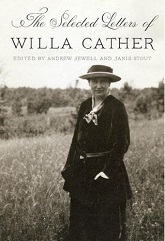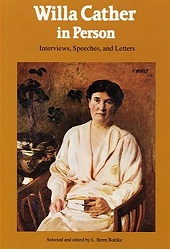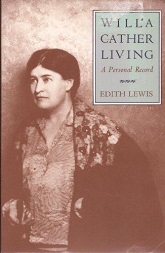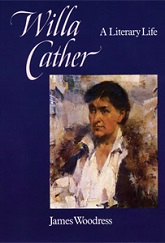Books on Willa Cather Recommended by Andrew Jewell
We recently asked Willa Cather scholar Andrew Jewell to recommend books on Willa Cather's life and work, and it is our pleasure to present his recommendations below. All books can be found in the Library stacks.
found in the Library stacks.
Andrew Jewell is a Professor of Digital Projects at the University of Nebraska-Lincoln and editor of the Willa Cather Archive, as well as a member of the Willa Cather Foundation Board of Governors. He is co-editor of The Selected Letters of Willa Cather and the forthcoming digital edition of The Complete Letters of Willa Cather.
Professor Jewell and fellow Cather scholar Robert Thacker discussed their research into Willa Cather’s books and letters and the influence of New York City on her work at the Library in February 2018. View the event recording here.
Though author Willa Cather has many fans, in my experience many of those readers are surprised and delighted to learn about the full range of Cather’s work. In addition to books about immigrant settlers and small town life in nineteenth-century Nebraska (O Pioneers!, My Ántonia, A Lost Lady), she wrote about academic families in the 1920s (The Professor’s House), the emergence of a world-class Wagnerian soprano (The Song of the Lark), French priests in the diverse culture of the American southwest (Death Comes for the Archbishop), an apothecary and his daughter in 17th century Quebec City (Shadows on the Rock), and antebellum Virginia’s slave-holding culture (Sapphira and the Slave Girl). Uniting her work, though, is a remarkable consistency of quality: as Cather matured and experimented with subjects and forms, she maintained her commitment to deeply consequential and beautifully rendered literary art.
Cather’s story and lively personality make the accomplishment of her body of work even more fascinating. She was born in Virginia, spent her adolescence in Nebraska, worked for twenty years as a journalist, and only emerged as a full-time, professional writer when she was in her forties, living with her partner Edith Lewis in Greenwich Village, a place they had known as a “very sedate Bohemia” (in Lewis’s words) since Cather arrived in 1906.
The following books about Cather will, I hope, give you a satisfying look into the life and work of the writer.
 Fans of her fiction may like to encounter an alternative form of her voice, one a little looser but no less vibrant, in two books: Willa Cather in Person (edited by L. Brent Bohlke) and The Selected Letters of Willa Cather (edited by Janis P. Stout and myself). The first is a terrific collection of pieces written about Cather during her lifetime, not reviews, but interviews and reports of her public speeches. Cather was a great talker, and the pieces are full of insight, wit, and memorable turns of phrase. The Selected Letters has some of the same pleasures, but offers a deeper dive into Cather’s intimate voice. Featuring a chronological selection of 565 letters to a variety of people, from everyday readers to old friends from Nebraska to eminent people in literature and the arts, the book dramatically broadens our understanding of Cather, her work, and her relationships.
Fans of her fiction may like to encounter an alternative form of her voice, one a little looser but no less vibrant, in two books: Willa Cather in Person (edited by L. Brent Bohlke) and The Selected Letters of Willa Cather (edited by Janis P. Stout and myself). The first is a terrific collection of pieces written about Cather during her lifetime, not reviews, but interviews and reports of her public speeches. Cather was a great talker, and the pieces are full of insight, wit, and memorable turns of phrase. The Selected Letters has some of the same pleasures, but offers a deeper dive into Cather’s intimate voice. Featuring a chronological selection of 565 letters to a variety of people, from everyday readers to old friends from Nebraska to eminent people in literature and the arts, the book dramatically broadens our understanding of Cather, her work, and her relationships.
 Two other books that provide distinctive views of Cather’s life and personality are memoirs by women who knew her well. Willa Cather Living, by Edith Lewis, was published a few years after Cather’s death and draws upon their long life together. Lewis is squarely focused on Cather’s writing life, and though she omits personal details that would be moving and meaningful to many, she creates a loving portrait with many insights into the creation of Cather’s works. Another friend, Elizabeth Shepley Sergeant, wrote a quite different sort of book in Willa Cather: A Memoir. Though she also celebrates Cather’s tremendous artistic achievements and offers fresh insights into Cather’s working life, she does so while painting a more complicated, sometimes critical, image of Cather. She sees Cather’s stubbornness and ruthlessness alongside her intellectual and artistic gifts, and that vision presents a very human, fallible, engaging version of the writer.
Two other books that provide distinctive views of Cather’s life and personality are memoirs by women who knew her well. Willa Cather Living, by Edith Lewis, was published a few years after Cather’s death and draws upon their long life together. Lewis is squarely focused on Cather’s writing life, and though she omits personal details that would be moving and meaningful to many, she creates a loving portrait with many insights into the creation of Cather’s works. Another friend, Elizabeth Shepley Sergeant, wrote a quite different sort of book in Willa Cather: A Memoir. Though she also celebrates Cather’s tremendous artistic achievements and offers fresh insights into Cather’s working life, she does so while painting a more complicated, sometimes critical, image of Cather. She sees Cather’s stubbornness and ruthlessness alongside her intellectual and artistic gifts, and that vision presents a very human, fallible, engaging version of the writer.
Finally, I will suggest two biographies by academics who spent years researching Cather’s life and work, and who write in an engaging, readable style. James  Woodress’s Willa Cather: A Literary Life is a fully detailed chronicle of Cather’s life with descriptions and summaries of virtually every work she published, a book that has been a central resource for understanding Cather since its publication thirty years ago. Janis P. Stout’s Willa Cather: The Writer and Her World is a beautifully-written book that thoughtfully interprets Cather’s complicated life and work by looking closely at the context of the world in which she lived it.
Woodress’s Willa Cather: A Literary Life is a fully detailed chronicle of Cather’s life with descriptions and summaries of virtually every work she published, a book that has been a central resource for understanding Cather since its publication thirty years ago. Janis P. Stout’s Willa Cather: The Writer and Her World is a beautifully-written book that thoughtfully interprets Cather’s complicated life and work by looking closely at the context of the world in which she lived it.
There are dozens more worthy books about Willa Cather that I could suggest, but these are some of my favorites, books I often turn to as I seek to better understand the writer. —Andrew Jewell

